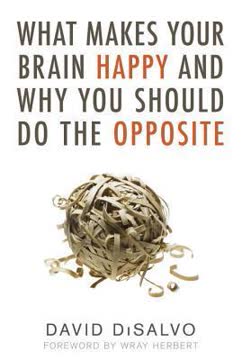Key Takeaways
1. Your Brain Craves Certainty, But Uncertainty Fuels Growth
The truth for us all is that when we feel right about a decision or a belief—whether big or small—our brains are happy.
Embrace ambiguity. Our brains are prediction machines, hardwired to seek stability, clarity, and consistency, perceiving unpredictability as a threat. This innate desire for certainty makes us "feel right," even when we're not, leading to cognitive biases like selective attention, framing, and confirmation bias. This "certainty bias" can blind us to obvious details or alternative perspectives, as seen in the story of Phil, the youth program specialist, who overlooked a blind student in a dark room because his brain had recalibrated to a "lights on" rule.
Challenge your assumptions. To counteract this, we must actively slow down and question our initial judgments. The "Gorillas in Our Midst" study vividly demonstrates how easily our attention can be selectively focused, causing us to miss glaring information. When faced with a situation, ask yourself:
- Am I seeing all the relevant details?
- Am I allowing my pre-existing beliefs to dictate my perception?
- Is my desire to "feel right" overriding a more rational assessment?
Growth through discomfort. While certainty makes our brains "happy," it can stifle creativity and problem-solving. Research shows that individuals with a lower "need for cognitive closure" are often more innovative. By consciously overriding our brain's natural leanings towards certainty, we open ourselves to broader perspectives and the discomfort that often precedes genuine growth and discovery.
2. Beware Your Brain's Discount on the Future
Whenever we are presented with a commitment that is a long way off, our normal tendency is to downplay the commitment—particularly if an immediate reward is involved.
Prioritize long-term. Our brains are wired for immediate gratification, a tendency economists call "hyperbolic discounting." This means we often undervalue future commitments or consequences in favor of present rewards, leading to poor long-term decisions. The example of accepting a new work project six months out, despite an already heavy workload, perfectly illustrates this trap. The immediate reward of pleasing a supervisor outweighs the distant, yet inevitable, future stress.
Recognize the sales tactics. Marketers and salespeople expertly exploit this bias by focusing on palatable monthly payments for big purchases like cars or houses, making the long-term financial burden seem less significant. They understand that the "rosy hue" of a short-term reward (driving a new car) can overshadow thousands of dollars in future interest. This also applies to personal favors, where the immediate gratification of saying "yes" to a distant request can lead to future regret.
Forecast your emotions. We are poor forecasters of our future emotional reactions, a "handicap" known as intensity bias. When making decisions, especially those with long-term implications, try to realistically imagine your emotional state when that future commitment becomes a present reality. This conscious effort to bridge the "forecasting gap" can help you make more balanced choices, preventing future overload and regret.
3. Your Mind Wanders, Use It Wisely or Get Lost
Being a space cadet appears to serve an important adaptive function.
Harness the drift. Our minds are mentally elsewhere for 30-50% of our waking hours, activating a "default network" in the brain. This mind-wandering isn't just a bug; it's an adaptive feature crucial for self-reflection, processing information, and fostering creativity. John Cleese's anecdote about sleeping on problems and waking with solutions highlights the brain's ability to problem-solve in this default mode.
Beware obsessive rumination. While beneficial, overindulgence in mind-wandering can be debilitating, leading to "obsessive rumination." This is particularly problematic when dwelling on negative thoughts, creating a self-defeating mental loop strongly correlated with depression. Alcohol, for instance, amplifies this tendency, causing minds to wander without us even noticing.
Manage the escape. The brain's reward system can be hijacked by external forces, leading to compulsive behaviors, especially with immersive e-media. Whether it's video games or social media, the brain's "reward-distinction blindness" integrates new, often disadvantageous, rewards into its circuitry. This can lead to a "compulsive continuation and intensification" of the behavior, as seen in cases of online gaming addiction, where the reward of virtual immersion overrides real-world responsibilities.
4. Self-Control is an Illusion, Not a Fixed Trait
For every aggressive move we make, our brains have a countermove.
Overestimate your restraint. We often fall victim to "restraint bias," repeatedly convincing ourselves we've overcome impulsiveness and can handle temptations we previously avoided. Dieters, smokers, and others with compulsions frequently relapse because they overestimate their self-control, exposing themselves to more temptation than they can manage. This suggests that self-control isn't a fixed trait, but a dynamic, often fragile, state.
The "what the hell" effect. One slip-up can quickly cascade into a complete abandonment of self-control. The "what the hell" effect describes how, after breaking a self-imposed rule (e.g., eating one forbidden snack), we rationalize further indulgence, believing we've already "blown it." This applies to various goals, from dieting to quitting smoking, where a minor deviation can lead to a full-blown relapse, making us feel farther from our goals.
Moral balancing act. Our brains engage in "moral self-regulation," a balancing act where a moral act in one area can offset a perceived deficiency or immoral act in another. This "moral cleansing" or "moral licensing" allows us to feel balanced, even when our actions are inconsistent. For example, buying "green" products might offset not recycling at home. This subtle mechanism helps maintain our internal sense of integrity, but can also rationalize questionable behavior.
5. Regret is a Teacher, But a Harsh One
For all the fear and loathing it generates—to say nothing of the thousands of songs and poems it inspires—regret is a deceptively complicated topic.
Wanting trumps getting. Our brains often prioritize the "power of wanting" over the "satisfaction of getting." The thrill of anticipation, like bidding on an eBay item, can be immensely powerful, often leading to a letdown or even regret once the item is acquired. This "regret of getting" is fueled by habituation, where the initial elation of a new possession or experience quickly fades into mundane appreciation, prompting the brain to seek a new reward.
The counterfactual conundrum. Regret serves an adaptive function through "counterfactual thinking"—imagining alternative past decisions to learn from mistakes. While useful for future choices, obsessive counterfactual thinking can be emotionally draining, leading to negative emotions or even depression. The challenge is to extract the learning without dwelling on what "could have been," as our reconstructed memories of past alternatives are rarely accurate.
Beware regret manipulation. Others often exploit our fear of regret to influence our decisions, a tactic called "preregret manipulation." Salespeople, for instance, might paint a worst-case scenario of not buying a product insurance plan, making you believe you'll regret the "wrong" choice. Recognizing this manipulation is key to making rational decisions, rather than being swayed by imagined future remorse.
6. You Are a Social Sponge: Influence is Everywhere
The truth is that our brains are not wired for complete independence. We are instead an exceptionally social species wired for interdependence.
First impressions are value judgments. When we first meet someone, our brains are actively engaged in "value processing," determining "what's in it for us." This involves activity in the amygdala (emotional learning, trust) and posterior cingulate cortex (reward valuation). Our impression management goals also influence how we perceive others; if we try to appear confident, we might unconsciously rate others as less confident.
Peers shape our reality. Peer influence is a powerful force, capable of genuinely changing our attitudes and values, even on subjective matters like facial attractiveness. Our brains interpret others' opinions as signals for effectively targeting the "best outcomes," leading to conformity. This extends to "identity-based convergence," where we align our choices with esteemed social groups to signal our belonging and status.
Propaganda's subtle sway. Our brains are susceptible to "illusions of truth" fostered by repetition and "cognitive fluency." Messages that are easy to understand and fit existing beliefs are more readily accepted, especially when attention is low. Advertisers and political strategists exploit this, knowing that repeated, simple messages often win over complex, nuanced arguments. Even fictional narratives in TV shows can influence our thinking on real-world issues, demonstrating the power of "narrative transport."
7. Memory is a Rewriter, Not a Recorder
Our memories are wrong at least as often as they are right.
Memory is a reconstruction. Our brains don't record memories like a video camera; they reconstruct them, often filling in gaps with fragmented information or even confabulated details. This makes memory highly fallible and susceptible to external manipulation. The EPA lead-awareness campaign example showed how people "recalled" seeing an ad based on fragmented cues, believing they had seen something they hadn't.
Images and trust distort memory. Studies demonstrate that repeated exposure to photos of completed actions can make people believe they performed actions they only imagined. Even doctored videos can convince individuals they committed acts they didn't, or that others did. Furthermore, once we trust an information source, we're less likely to scrutinize future information from them, leading to the creation of false memories, even over long periods.
False beliefs from false memories. This malleability of memory can lead to the development of false beliefs about ourselves and others. Studies have shown that "prevalence information" (how commonly an event happens) can make people more confident they experienced implausible events, like demonic possession or barium enemas as children. Recognizing that our memories are imperfect is crucial to avoid chasing "make-believe rabbits."
8. We Are Born to Copy, Practice Deliberately
We are all born imitators, and a good chunk of our lives is spent playing out the evolutionary version of the mirror scene.
Imitation is fundamental. Humans are born imitators, a hardwired learning strategy crucial for development. However, this can lead to "overimitation," where children pointlessly copy irrelevant adult actions, even when a simpler, more logical path to a goal is obvious. This suggests that our brains encode all observed actions as potentially meaningful, making it difficult to distinguish between purposeful and purposeless behaviors.
Practice for the purpose. Achieving mastery requires "deliberate practice"—focused effort designed to develop specific skills for a particular role. Simply putting in "ten thousand hours" isn't enough; the practice must be purposeful. Specialization often trumps general problem-solving, as context-specific knowledge and memory are more effective than broad, generalized abilities. London taxi drivers and even burglars demonstrate how deliberate, specialized practice leads to automatic, instinctive mastery.
Avoid burnout. Poorly directed practice is a drain on the brain, leading to burnout and premature surrender. Understanding your motivational style (e.g., whether you're a high or low achiever, or how competition affects you) is key to "gaming the system" for better performance. For low achievers, making tasks "fun" can boost motivation, while high achievers might be undermined by it.
9. Close the Gap: From Knowing to Doing
The vital point to remember is that the gap between knowing and doing is ever-present until we commit to acting.
Elevate awareness, then act. Effectively addressing our brain's problematic tendencies requires a two-step process: elevating awareness of why we think and act a certain way, and then taking deliberate action. Science-help provides the tools for this awareness, but commitment to action is paramount. This means actively slowing down, challenging biases, and engaging in metacognition—thinking about our thinking.
Strategic self-management. Implement practical strategies to work with, rather than against, your brain's defaults:
- Slow down: Diffuse problems, consider all factors, avoid rash reactions.
- Check biases: Be aware of pre-existing beliefs, availability bias, and framing.
- Accountability: Engage others to help you stick to commitments.
- Short-term rewards: Break long-term goals into smaller, rewarded increments.
- Tangible goals: Make goals measurable and track progress.
- Finish what you start: Leverage the Zeigarnik effect by simply beginning.
- Ask, don't tell: Reframe self-talk as questions to build motivation.
- Form useful habits: Understand the time and consistency required.
Embrace imperfection. Our brains are "imperfect wonders of nature." We are not rational automatons, but complex beings influenced by countless seen and unseen factors. Accepting this reality, rather than striving for an unattainable ideal of perfection, allows us to make meaning in our lives by consciously navigating our hardwired tendencies and making deliberate choices for a more fulfilled existence.
Last updated:
Review Summary
What Makes Your Brain Happy and Why You Should Do the Opposite receives mixed reviews. Some readers find it fascinating and insightful, praising its accessible explanation of cognitive biases and neuroscience. They appreciate the practical tips for overcoming mental pitfalls. Others criticize it for being too superficial, poorly organized, or repetitive of other psychology books. Some find the writing style engaging, while others consider it boring. Overall, reviewers agree the book offers interesting information on how the brain works, but opinions vary on its depth and effectiveness in presenting the material.
Similar Books





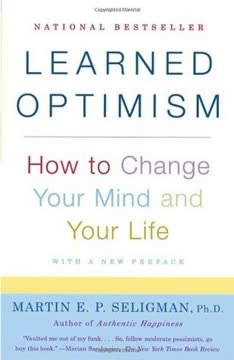
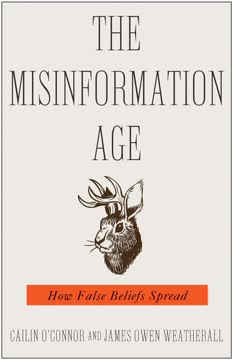
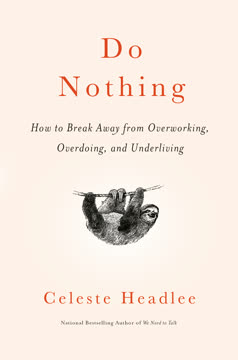
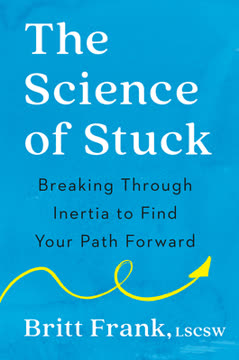
Download PDF
Download EPUB
.epub digital book format is ideal for reading ebooks on phones, tablets, and e-readers.
